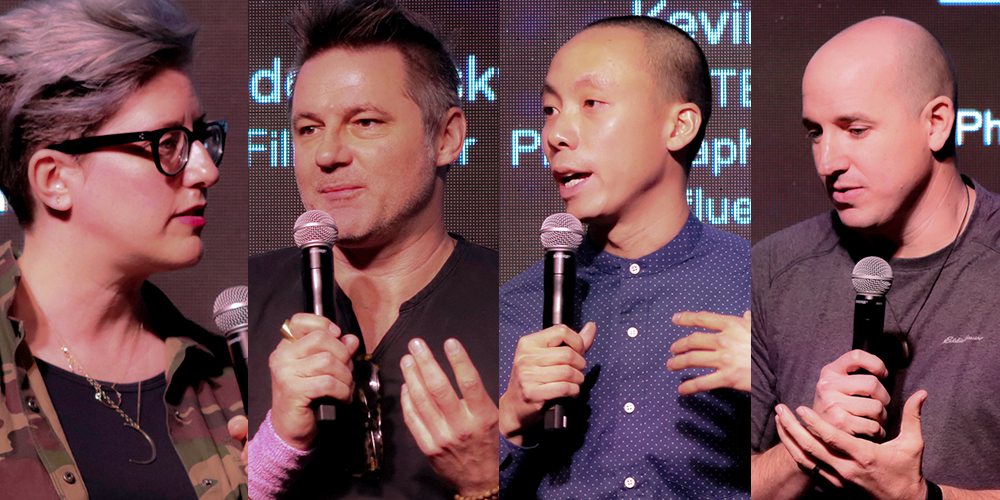Innovative storytellers discuss the changing ways we create and consume media in the 21st century.

For the uninitiated, SXSW is a festival of epic proportions that overtakes Austin, Texas, every March. What began 31 years ago as a city-wide celebration of up-and-coming bands has transformed into a mecca for tech entrepreneurs; a Mardi Gras for multimedia professionals. Directors, editors, and photographers from around the world meet up to discuss industry shifts and the newest groundbreaking gear.
One major hub of this year’s excitement was our #DellExperience, just across the street from the city’s convention center. The Experience allowed attendees to see tech innovation up close and hear from disruptive leaders making transformation real every day. On Wednesday afternoon, Adobe’s Margot Nack led a panel, The Art of Media: Creation to Consumption, with an impressive row of guests: Vashi Nedomansky, Kevin Lu, and Colby Brown.
Her first panelist, Vashi Nedomansky, is the editor of 11 feature films and an editorial team trainer for many others, including the films Gone Girl and Deadpool. Vashi relied on a Dell Precision Workstation to edit his latest film, 6 BELOW, a stunning achievement on multiple levels. The movie, starring Josh Hartnett and Mira Sorvino, is the first major motion picture to be edited in 6K RAW. “There’s no way I could cut 6K footage – which is 9X bigger than HD – on another computer,” said Vashi. “You can’t have herky-jerky playback. Literally, we had to have the most powerful machine.”
Hear Vashi talk about the unique challenges of editing ‘6 Below’
Getting Your Work Out There
“In the digital space, our goal is to get content in front of as many faces as possible. Whether that’s for marketing campaigns, movies or creating things for ourselves,” said Colby Brown, a world-traveling photographer and humanitarian. “Staying ahead of the wave, ahead of the momentum is crucial in all our industries. There’s a reason that I’ve partnered with companies like Dell that make my life as a creative easier.” 15:00- 15:22
“Technology is now so much more accessible. Everyone in this room is a content creator as well as a consumer,” said Brown.
Lu, who uses his smartphone to shoot eye-catching images for companies around the world, agreed that today’s tech is more manageable. “Now I have so many ways to tell a story,” said Lu. “I can tell a story in different formats and from different angles.”
Editing in the Air
Constantly staying ahead of the wave and creating buzz-worthy work that awes and amazes audiences online is an around-the-clock job. Luckily, today’s post-production process has become more mobile.
“A lot the post editing I do, I do on my Dell XPS workstation,” said Lu. “When your software is on the cloud, you can hop on any device.”
Vashi explained how the business has become more flexible in the last decade. “Ten years ago you had to rent an editing room, it was expensive and getting there was miserable. Now I edit big features at home or on the road. I can literally go anywhere.”
Nack mentioned that many professionals she’s spoken with now enjoy air travel, because of the work opportunities. “Now we look forward to long flights,” Vashi replied. “Because we can edit anything onboard with portable, powerful technology.”
Will Artificial Intelligence (AI) Make the Cut?
Near the end of the event, a member of the audience asked the panelists if they viewed AI as a competitor to their work. Vashi responded first. “As an editor, no. AI can recognize shapes, faces, colors. It can create music and use patterns to create a good edit. But a great edit is something you respond to emotionally,” he said. “The gap between AI and a human editor is still noticeable.”
“I don’t think it’s a threat. It can be helpful,” Lu told the crowd. “Facial recognition that helps you get focus quicker – that’s AI, too. If it’s helpful, I want to play around with it.”
Hear the Panelists Answer the AI Question
In a changing industry, with so many new options, Vashi encouraged the crowd to stay true to their ideas and focus on the fundamentals of craft. “Story beats technology,” he said. “But story needs technology.”
Watch the full panel discussion here, and check out replays of other events at the #DellExperience.